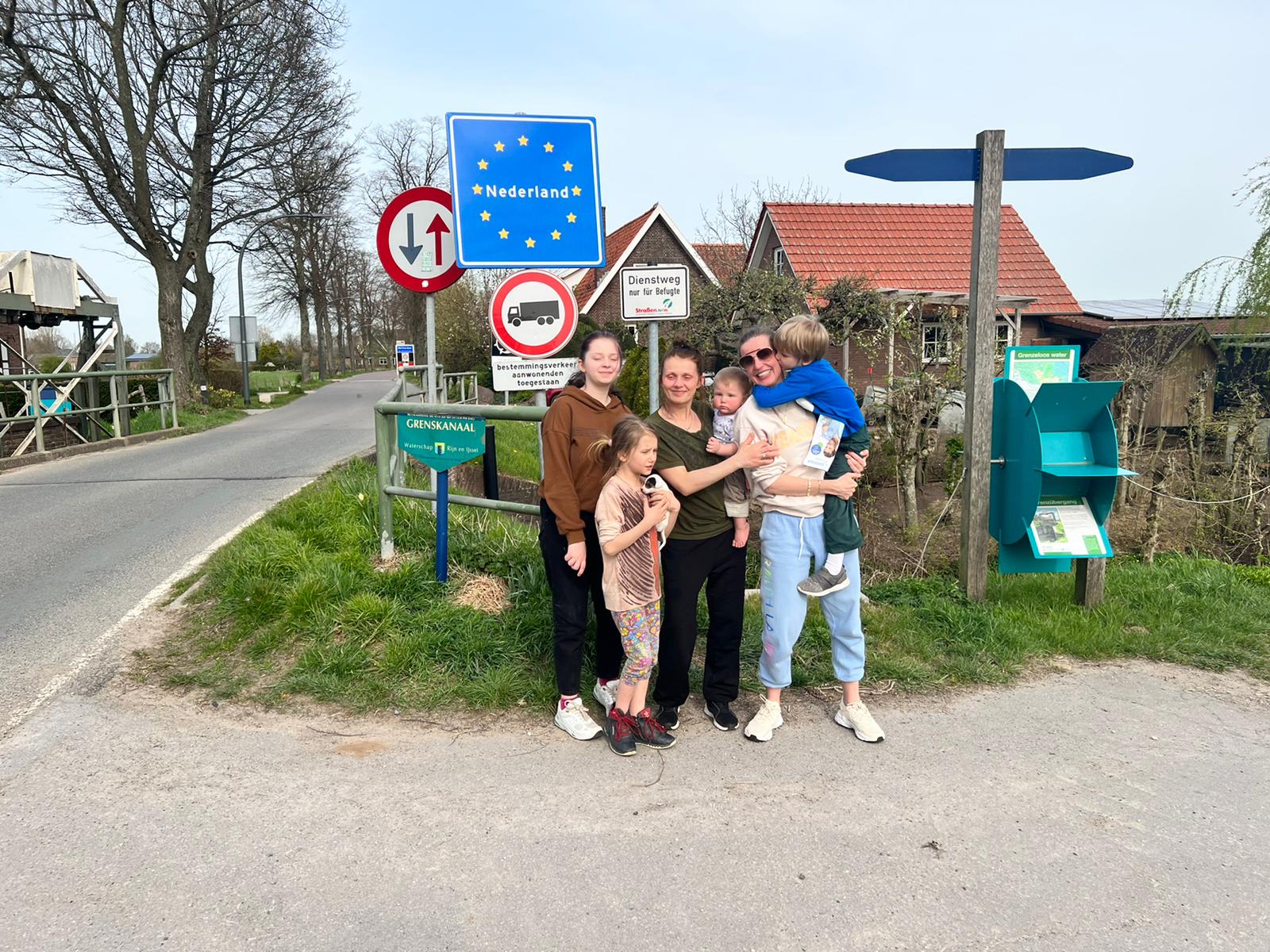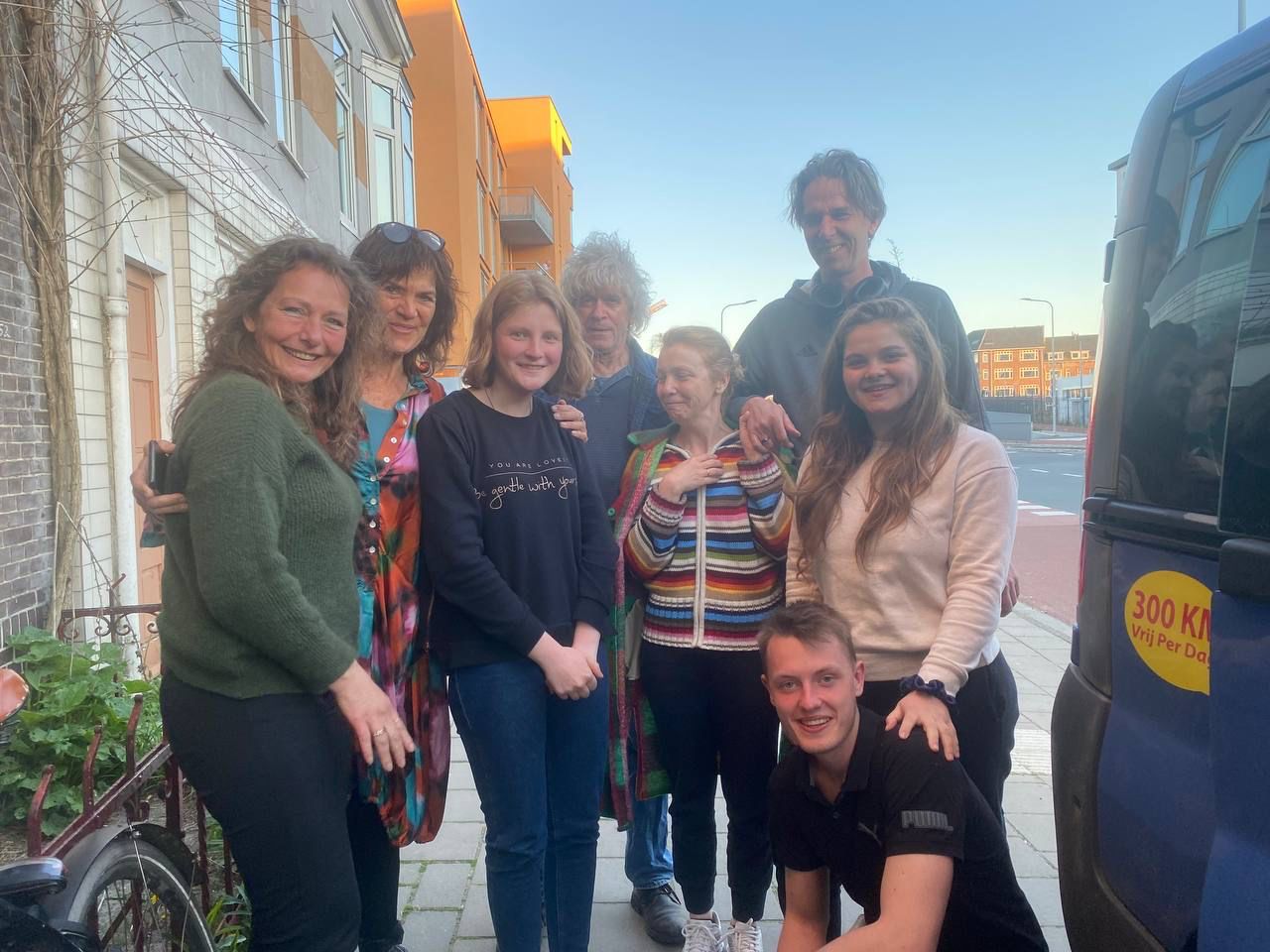Partnership Spotlight: On My Way Ukraine has driven 1400 people from the Ukrainian border to safety in NL.
People for People matches people and foundations in need with companies that can fulfill these needs. We enable organizations such as Movement On The Ground, Takecarebnb, OpenEmbassy, FastLaneUkraine, On My Way UA, the Netherlands for Ukraine, and Lifeline Ukraine to increase their impact. This week’s partner spotlight is On My Way UA.
We had a chat with Marloes Pomp and Wouter Neef, who not only wanted to donate money but wanted to be involved in what is happening in Ukraine. On My Way Ukraine has already driven 1400 people affected by war from the Ukrainian border to the Netherlands. The organization also helps them with housing and delivers humanitarian aid to Ukraine.
Marloes: “I think many people felt frustrated and would like to offer their help. At the beginning of the war it was not easy to get started. But I wanted to see what was needed with my own eyes. So I didn't want only to donate money. I wanted to be involved. I wasn't thinking about practical things. I just decided to rent a van and drive to the border. My brother offered his help, so we went together. Then I made a post, it was like "mothers are helping mothers,". It is important that women also drive. It’s a story about trust. We tell the refugees: we will drive you and your kids safely and will figure out during the ride where we can host you. It feels much safer for the women with children when there’s a woman telling them this.
Then I received a lot of phone calls and messages, with good questions like "where can I find info" or ”what about housing?", "do we need to bring food?", "do you have an address, where can we drop donations?" etc. That was a starting point for me to think about making a guide with all those answers. I started a WhatsApp group, where we can organize everything.
That's how it all started for me. But I drove at the exact moment as Wouter. He also saw my post on Linkedin. Wouter is my partner, and he figured out several places and how it works. And we combined that. I don't know how we found each other - that's the energy.”
Wouter: “I was planning to drive to the border, but my friends told me that was too crazy, as we didn’t know where to go and what to do. I think that was the first weekend when the war started, and then I decided to stay home. But when you are sitting home and feeling you are doing nothing…so I decided to join another group. And then, I saw a message from Marloes on Linkedin and decided to join their forces. And I can say if you don’t glory yourself you can provide a lot of help, try to organize things. That’s what I was involved in On My Way UA. Track the items, trying to manage them. So the people who participate could be as influential as they can, bringing the right supplies and matching them with refugees, those who need their help. That’s what I was focusing on.”
Wouter: “No, we didn’t know each other personally, but we were at the same student association, so we knew the same people but didn’t know each other before. And this is also very special about doing this because basically, you are working with a lot of people you don’t know, most of them we’ve never met in person actually, we performed a lot online. So everyone brings their superpower in organizing things or connecting with the right people with funding and volunteers you need, so it’s exceptional.”
So after this first emotional week, you decided to launch a foundation? And to do it in an organized way?
Marloes: “Yes, because at first, people asked how can I help and how can I make a donation, but I didn't think about that. So let's start a foundation, also for fundraising. We didn't know each other with all those people, but what they were doing, they were doing quite well, in a professional way. So a formal foundation is also the best way to get this organized.”
Marloes: ‘We only have volunteers like ourselves and have a team of eight people working full time. And we have around 250 volunteers driving. That's the most active community I've ever been a part of. Sometimes there are so many messages, and they are so willing to help.”
Marloes: “We already have around 1400 refugees who drove from the Polish-Ukrainian or Ukrainian-Romanian borders. All the community is doing that - drivers and coordinators who connect drivers and refugees in the refugees center. And also, we connect refugees with people who provide them housing.”
You assist and support them from the border to the Netherlands and here also. And also, I read that you provide humanitarian aid, right? So how do you find the partners, the supplies, and how is the work organized?
Marloes: “Yes, the team is responsible for filling the vans and touring cars by themselves. Mostly they get donations from friends and family, and together they buy or get this humanitarian aid. Sometimes there are specific needs like some medical stuff; we also help them with the information where they can buy this or get it. Sometimes we provide them with advice, but the teams are responsible for filling the bus. And we also have a WhatsApp group for people who are not willing to drive but want to help. So they help with filling the bus. We provide them with some crucial addresses and where to find stuff. For example, I went myself to Romania with many medical things. It cost like 30k euros. We are responsible for controlling that humanitarian aid goes directly to the Ukrainian hospitals; we don’t drop them at a random donation point.”
Marloes: “All foundations come from the network of the drivers.. We have no clue about direct numbers; the drivers collect money by themselves.”
Wouter: “The buses provide aid that costs a lot of money, but the teams collect financial assistance by themselves. And then, they can provide the foundation with the materials to give the trust that supplies are in the right place, the money is well-spent, and refugees receive help.”
Marloes: “For example, we have a sponsor for the buses. When teams go to families, we have a sponsor, who provides rental cars, but it goes directly from a sponsor to the team, not through our organization. And what we pay for is that we have volunteers now at the refugee center, and we pay for their hotels and food because they can volunteer for a few weeks and months.”
Marloes: “In the beginning, we went to the refugee center, which was at least one day for the families to fill. Finding the right people who will go to the Netherlands took at least a day. After that, the processes are much more smooth; we also have a driver's guide with many instructions. Now it's much easier to drive; it doesn't take a lot of time for the team to get started. We also have a lot of people driving several times. So the community is very connected. They become very involved and help each other. But now we need to find more drivers to continue this because not all are driving several times.”
Wouter: “I think most drivers want to continue this cause they've seen how everything is well organized on the ground, in the volunteering centers. They see that their work is needed. And it motivates drivers to go again, cause they know that we have a splendid view of what's happening. We learned from the first couple of weeks that it is good to have a foundation because it gives closer collaboration, more trust, and safety for refugees.”
Yes, it’s crucial when people see everything with their own eyes; they feel emotional and have an accurate picture of what’s happening. I think you spoke to many Ukrainians for the last time, and what were the most impressive and touching stories you’ve heard?
Marloes: “The first day of driving feels like a holiday – you get to the border. It’s pretty relaxing. But on the second day, you find the people who want to go to the Netherlands, and you also hear their story. You feel very responsible because you are the only person; they are in your hands. So the second day is always emotional for the drivers. The second day is also quite busy for the drivers because they have to deal with where to bring refugees, what they need for housing if they have relatives in the Netherlands, or can you find accommodation nearby.”
Marloes: “We work with several organizations like ‘’Netherlands for Ukraine’ and others, fill the form, and do the matchmaking. For example, I had a grandmother and her son was in a particular place in the Netherlands, and we needed to bring her to him. And made some calls to find the right place for her. So a lot of people are now involved in the Netherlands. So the third day is quite busy because you need to organize accommodation.”
“Two days ago, one of the volunteers Maureen brought a wounded 21- years old guy who had surgery a day before… So you hear those stories…involved in it, but you need to continue to work.”
Marloes: “For the refugees, it is so important to use a cell phone. They might be pretty afraid during the ride, and with a phone, they can stay in touch with their relatives. And when they arrive in the Netherlands, the sim card doesn’t work anymore, so they need a new one. And People for People help us with a lot of sim cards from T-Mobile. So for refugees, it is a relief to keep using their phones.”
“Also, volunteers have a registration desk in the refugees center, and People for People helped us with a banner, and T-shirts, so refugees can find them easier.”
Wouter: “What we would like is to find new volunteers in different areas, for example, to help with translation, driving, coordination, and help in the refugees center. And People for People is helping us a lot with this issue”
Drivers who would like to drive to the border to bring goods and bring refugees to the Netherlands (sign-up here: https://omwua.nl/nl/drivers/)





